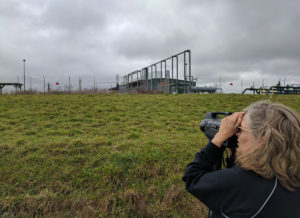On any given day in the Texas oil fields, operators are legally permitted to let natural gas go up in flames. As Earthworks’ field investigations have found, they also let it go up in smoke.
Recent studies indicate that flaring and venting of gas is on the rise in the Lone Star state, and that levels of resulting pollution are far higher than oil producers claim. A long standing industry excuse is that while oil is a money-maker, the continual decline of natural gas prices makes it easier to flare gas as a “waste product” than to capture, transport, and sell it.
In permitting flaring, regulators assume that most of the gas is combusted.
But the reality documented by Earthworks using optical gas imaging (OGI), which makes normally invisible pollution, visible, is that Texas oil operators are having one heck of a time keeping their flares lit, and increasingly so over the past few years. We know this because our field staff have made hundreds of visits to oil and gas operations in Texas and documented them through our Field Investigations.
Unlit flares may look harmless to the naked eye, and far less scary than a burning flare. But they are worse for climate and public health than flaring because they effectively serve as vent stacks—spewing untold, and often unreported, volumes of pollution straight into the air. This includes both methane, a greenhouse gas 86x worse for the climate than carbon dioxide, and health-harming volatile organic compounds (VOCs) like benzene, a carcinogen.
It’s possible unlit flares are on the rise because operators just don’t want to bother. Fixes exist to keep flares going (like auto igniters and sensors), and equipment problems can be resolved through regular maintenance and repair. Yet we have documented flares that remain unlit for days, weeks, months—and even over a year.
The oil and gas industry has had a decade of self-inflicted debt. Now it has to contend with the Saudi-Russian oil price war, partly aimed at US oil producers, and the COVID 19 pandemic crisis that’s stopped our fossil fuel-driven economy in its tracks.
This one-two punch has sent oil and gas prices spiraling down, with no end in sight. We have observed and documented that as prices go lower, operators increase their disposal of gas into the atmospheric dump. The International Energy Agency has just confirmed this could well happen during the current downturn. Texas companies and the TCEQ have a choice to make: get their flaring house in order, or make the current health and climate crisis even worse.
Your Support Makes Our Work Possible
Earthworks helps families on the front lines of mining, drilling, and fracking. We use sound science to expose health, environmental, economic, social, and cultural impacts of mining and energy extraction. To support our efforts, please consider a tax-deductible donation today that will go toward our work reforming government policies, improving corporate practices, influencing investment decisions, and encouraging responsible materials sourcing and consumption.

